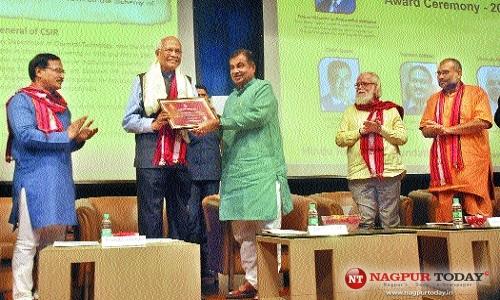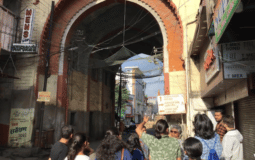Padma Vibhushan Dr Raghunath Mashelkar honoured with Nagarjuna Award and Padma Bhushan S Nambi Narayanan with Acharya Bharadwaj Award, in a felicitation programme in Nagpur

Nagpur: Nagpurians on Sunday were blessed with the good fortune of hosting, and listening to, two of the pioneers in the field of Indian science and technology — Padma Vibhushan Dr Raghunath Mashelkar and Padma Bhushan S Nambi Narayanan.
Responding to their felicitation in a glittering ceremony, both the eminent Indian scientists and innovators pitched for ancient Indian science and technology getting due recognition at International level. They also discussed how Indian sages and seers pioneered ancient technologies far before the world did.
Hindu Research Foundation and Maitree Pariwar Sanstha launched the first International award to honour acclaimed scientists and scholars of India and the world. Dr Mashelkar and S Nambi Narayanan were honoured in the ceremony organised jointly by these two organisations at Kavi Kulguru Kalidas Sabhagruha, Persistent Systems, IT Park in Nagpur. Dr Mashelkar, former Director of National Chemical Laboratory and former Director General of CSIR, was honoured with ‘Nagarjuna Puraskar-2022’ at the hands of Nitin Gadkari, Union Minister for Road Transport and Highways.
S Nambi Narayanan, a former ISRO scientist who developed ‘VIKAS’ liquid engine and on whose life is based the movie ‘Rocketry’, was honoured with ‘Acharya Bhardwaj Puraskar-2022’ at the hands of Swami Vigyananand, Founder President, World Hindu Congress. The award comprised shawl, shreeful, memento, and Rs 1 lakh cash.
Addressing the gathering, both the eminent scientists of world repute shared in brief their stories of struggle and overcoming the odds, and also enlightened the audience about the rich tradition of science and technology in India.
“The Indian civilisation has a strong tradition of science and technology. Ancient India was a land of sages, scholars and scientists. Research has shown that from making the best steel in the world to teaching the world to count, India was actively contributing to the field of science and technology centuries before the modern laboratories were set up,” said Dr Mashelkar. However, he rued, the world never recognised Indian traditional knowledge. But, he added, Indian scientists in the modern era, with their work, were compelling the world to acclaim India’s traditional science.
S Nambi Narayanan led his team to develop the ‘VIKAS’ engine and helped India leapfrog into the era of PSLV rockets. He also envisioned and worked towards developing a significantly more advanced Cryogenic Engine indigenously, to help India launch heavier satellites to higher orbits. “There is no match to Indian traditional knowledge. Our sages and seers were the pioneers in medicines, astronomy and other technologies. Indian Space and Research Organisation or ISRO named its first satellite after Aryabhatta and second one after Bhaskaracharya to recognise the contribution of both the sages in the field of space technology,” he said
S Nambi Narayanan spotted city-based former ISRO scientist Dr Prakash Mujumdar in the audience and said, “My colleague Dr Mujumdar is here. He was witness to our struggle for liquid propulsion systems.”
Gadkari, who was the chief guest, emphasised on promotion of Indian values and ancient technology. “We are on the path to becoming ‘Vishwaguru’ (world leader). To achieve this goal, we have to do more research on our ancient science and technology. Knowledge is power, and conversion of knowledge into wealth is the future. Conversion of knowledge into wealth is possible only after using spirituality with ancient science,” he observed. He added that it was high time for India to develop an education system based on ancient technology. Swami Vigyananand presided over the event. He shed light on the ancient Indian knowledge systems and how modern-day politics kept people away from studying those.
Dr S Arunan, Director, Mangalyaan Project, ISRO; and Prof Madhusudan Penna, Vice-Chancellor, Kavikulguru Kalidas Sanskrit University, were the guests of honour. Prof Penna also expressed his thoughts on this occasion. Dr Anita Tidwe compered the event. Dr T S Bhal, former Additional Director General of Police, made introductory remarks and also proposed a vote of thanks.














